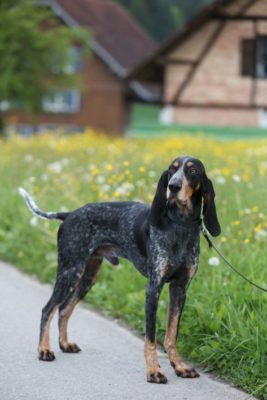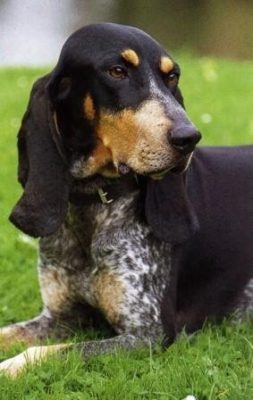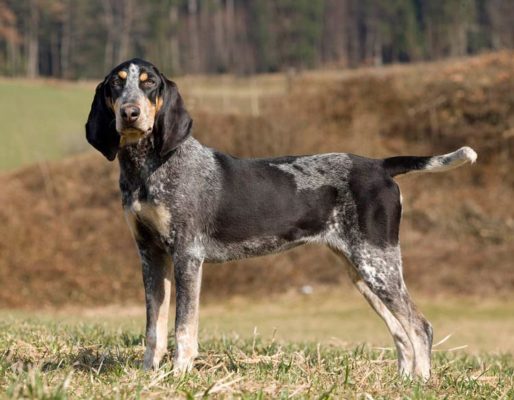Lucerne Hound
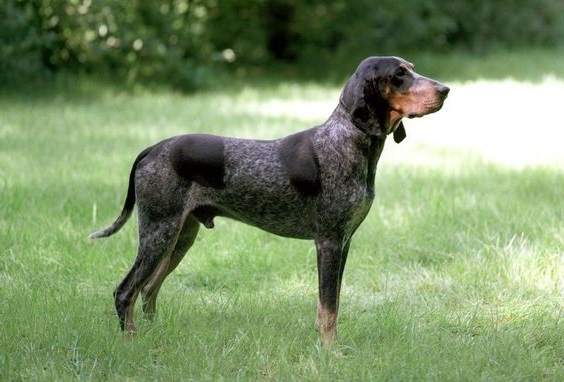
The Lucerne Hound may well become a pet, but the future owner must create all the necessary conditions for this. The dog needs plenty of exercise and active games. The hound is adapted to work, so it is better not to breed this breed for fun. The hound is friendly and easy-going, so that it will suit the role of companion in a large family.
Table of Contents
Breed Information
| Another Name | Lucerne Laufhund |
| Origin | Switzerland |
| Height | Males 49-59 cm Females 47-57 cm |
| Weight | 27-30 kg |
| Fur | Short, tight, well-fitting |
| Color | Bluish-gray or strongly mottled, with black spots or black checks |
| Lifespan | 11-14 years |
| FCI Classification | Scent hounds and related breeds |
| Group | Hunting dogs |
| Price | From $500 |
Breed Photos
Origin History
The history of the Lucerne Hound began in Switzerland in the Middle Ages. The breed is considered to be very ancient, and there is proof of it. In the Zurich cathedral, drawings of the XII century with the image of the hound were found. At that time, local hounds were crossed with imported French little blue Gascon hounds. The breed inherited from them an excellent sense of smell.
The Lucerne Hound is used for hunting wild boar and deer. The dogs have close relatives, all having the same standard. The Bernese, Schwyz, and Jurassic hounds differ from the Lucerne Hound only in color. They are all named after the cantons from which they originated.
Appearance
The Lucerne Hound has an elongated head, narrow muzzle, and strong jaw. The ears are low set, floppy, rounded at the ends. The eyes are oval. The neck is muscular and long. The body of the hound is elongated format; the back is compact. The chest is deep, and the ribs are convex. The tail is usually of medium length, tapering from the base to the end. The limbs have a strong backbone. The coat is short and smooth. The characteristic color for the Lucerne Hound is bluish-gray or heavily mottled, with black spots or black checks, and there may be deer-colored markings above the eyes.
Character
The Lucerne Hound may well become a pet, but the future owner must create all the necessary conditions for this. The dog needs plenty of exercise and active games. The hound is adapted to work, so it is better not to breed this breed for fun.
The hound is friendly and easy-going, so that it will suit the role of companion in a large family. Its energy is overpowering, life in four walls is contraindicated to the dog. Ideally, it should be a home with a large area where the hound can run wild at any time.
To children, the hound shows affection and even care. Do not forget that if children come into the family later than the dog, it can cause jealousy. It also applies to new pets in the house. Pay attention to all equally. Otherwise, the hound may change its behavior in the wrong way.
The Lucerne Hound does not tend to be aggressive with other dogs. It never goes to conflict, but it is always ready to stand up for itself and the owner if it feels threatened.
The dog has a small size, but the enormous reserve of energy and endurance allows it to hunt for many hours. The Lucerne Hound is ready to chase game on absolutely different terrains. This breed is confident, makes the right decisions while always listening to its master. The dog’s versatility lies in the fact that it can hunt in a pack or alone, on large or small games. Hunters appreciate the ringing bark of the Lucerne Hound. But it can be a problem at home.
Care
The Lucerne Hound is very easy to care for. It requires only basic care. To keep its coat shiny, it needs to be brushed weekly. There is no need to bathe the dog often. After an intensive walk, it is enough to wipe the dog with a damp cloth. It is better to clip the hound’s claws once a month, especially if they do not sharpen on their own. The ears of an alfalfa hound need a daily check. Dirt can collect there, which can lead to infection later on.
It is important to provide a comfortable environment for the pet. It can be an insulated aviary, as personal space is very important for a dog.
Training
It is necessary to train the hound from the very first days of its arrival in the house. It must learn the rules; otherwise, it will begin to dictate them on its own with its inconsistent behavior. During training, the owner may encounter stubbornness. It is characteristic of many hunting dogs. The willful character is appreciated during the pursuit of prey and full dedication to this activity. But in normal circumstances, this behavior must be corrected.
The more the owner explores the world around him with the little puppy, the more the dog will adjust to life. Socialization is important for the hound, so let him play with other dogs for as long as possible.
A visit to the dog playground can replace regular walks. Active play with toys will only make your pet happy.
Common Diseases
The Lucerne Hound has good health. It is best to keep it from getting too cold and being out in the sun for too long. After every walk, inspect your pet for pests. Hygiene of the dog’s ears will prevent various infections.
Here are the diseases to which the Lucerne Hound is prone:
- otitis media;
- ear infections;
- arthritis;
- sprains, torn ligaments.
Nutrition
The dog should receive a balanced diet. The diet can be the meat of animal origin, in a separate meal can be given cottage cheese. To increase the appetite, the type of meat can be alternated. Do not forget about cereals and soups, with which you can diversify the diet. It is better to soak bread in the broth before serving.
Do not overfeed your dog. When physical activity increases, portions should be larger. If your pet won’t touch food, it’s best not to ignore it and see a specialist.
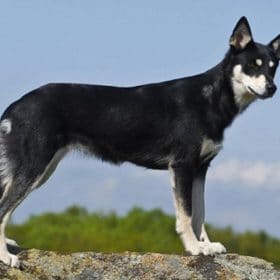 Lapponian Herder
Lapponian Herder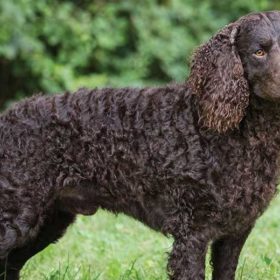 American Water Spaniel
American Water Spaniel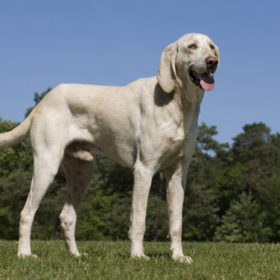 Billy
Billy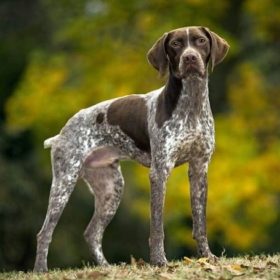 Braque Francais (Gascogne)
Braque Francais (Gascogne)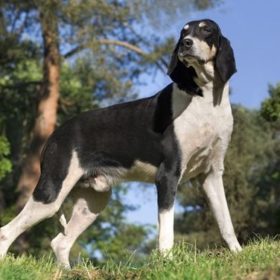 Chien Français Blanc et Noir
Chien Français Blanc et Noir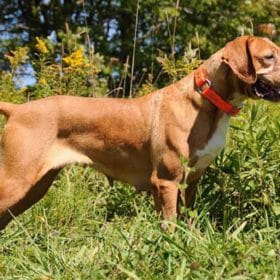 Portuguese Pointer
Portuguese Pointer